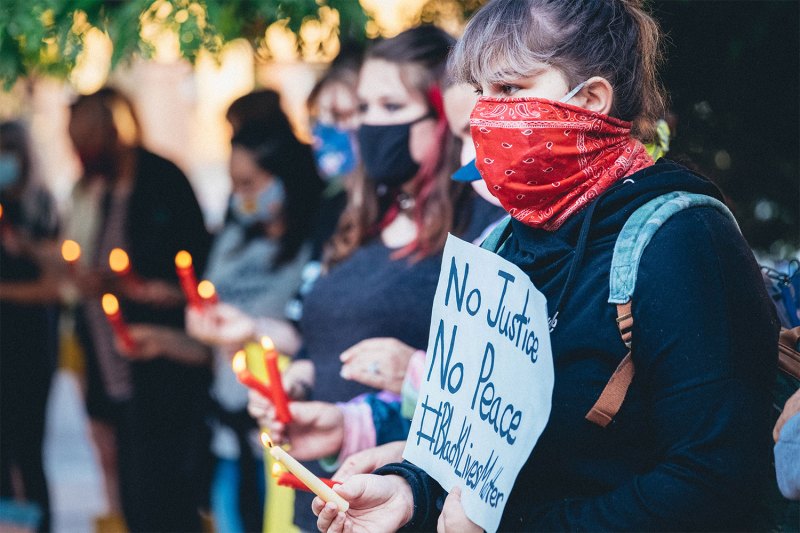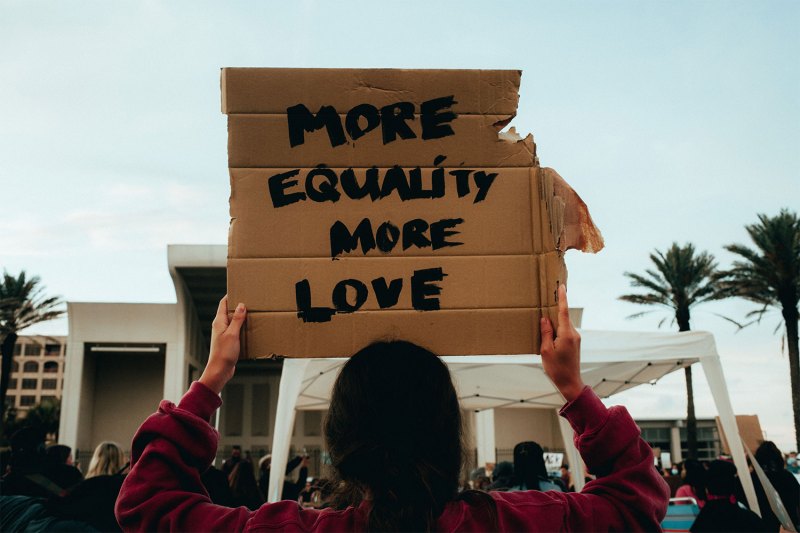Talking with your family about race and social justice can be scary, awkward, and uncomfortable. If you’re a white ally like me, you probably grew up sweeping these kinds of topics under the rug, either because they felt like ancient history or because they didn’t affect you directly. The reality is that our privilege protected us from needing to have certain conversations about police brutality and systemic racism that our Black classmates, friends, and neighbors simply couldn’t avoid. But, that was then, and this is now, and it’s high time to end the silence.
So, how do you do that? Well, it’s a great question and one that doesn’t have a simple answer. This isn’t going to be a one-and-done conversation. In fact, it may take months or years to untangle the web. You may make meaningful progress today only to find that things are right back to square one tomorrow. But you mustn’t stop the work. It’s vital and crucial and labor that we as allies have to take on.
To that point, I want to acknowledge that I am a white, queer, non-binary person. I’ve got a lot of privilege and am mostly speaking to my fellow white allies in this post. I’ve compiled tips that have been useful for me in the past as well as some things to consider when navigating these conversations. It’s far from a complete guide, but should provide you with some inspiration for crafting your own plan of attack.
Consider Your Purpose
Before you engage in a conversation about race or social justice with your family, take a minute to consider your purpose. While things may get heated, you’re not here to argue. You’re here to spread love and awareness on a topic that’s important to you. You’re here to do the work and serve the cause by engaging with loved ones who need to learn a thing or two. Keeping a tight focus on your mission will help you stay calm and navigate any uncomfortable moments that might arise.

Educate Yourself
While you don’t need to be an expert on social justice issues to chat with your family members about them, it’s always helpful to do your homework. If you want to talk to your mom about defunding the police, for example, consider listening to activist Angela Davis’ talk on the Prison Industrial Complex or reading Invisible No More: Police Violence Against Black Women and Women of Color by Andrea Ritchie. Getting your facts straight will allow you to answer questions deftly, keep the conversation moving, and avoid any gaslight-y arguments.
Anticipate Pushback
That being said, it’s important to anticipate some pushback. If your family members aren’t familiar with these topics or generally shy away from “heavier” conversations, you can expect for there to be some tension. Thankfully, you probably know your family pretty well, so you should be able to predict how they’ll respond to certain things. By doing this, you can prepare rebuttals that recenter the conversation and neutralize any anger. Speaker and activist Sinead Bovell has created some fabulous responses relevant to this current moment, which could help you plan out your own.

Keep it Intimate
In my experience, having these conversations with just one or two people at a time is most effective. This intimacy promotes better listening, less hurt feelings, and more opportunities to explain yourself thoroughly. And you don’t necessarily need to do all this in person! Engage in a text chain, start things off on a solo phone call, whatever line of communication works best for you.
Be Organic and Personal
To that end, I’d recommend trying to incorporate some of these things organically into conversations you’re already having. Look for natural opportunities to address current events or check in about the political climate. One way to do this is to keep it personal and offer up an observation or feeling you’ve been having. “I’ve been really moved by all the powerful protests going on around the country and would love to speak to you about them” or “I’ve been having a hard time processing all the news and wondering how you’re coping,” are two examples of how to begin that dialogue.
Their response will let you know whether they’re ready to dive into something deeper or if you should keep it pushing to another topic. Getting a sense of where they’re at will also help you prepare for a larger conversation later on.

Meet Them Where They’re At
Speaking of meeting them where they’re at, it’s crucial to tailor your messaging for different folks. The way you talk about racial justice with your Gen Z brother might differ from how you broach the topic with your boomer aunt. Think about their familiarity with the subject, what kinds of views they already hold, and whether or not they keep up with the news. Then, consider what entry points you can use to engage in the work.
If your mother’s a teacher, for example, maybe discuss how defunding the police could actually help get more money to public schools. If your father takes issues with protest violence, talk about some of the peaceful actions you’ve observed or seen.
Stay Calm
Once you get the conversation going, stay calm. Seriously. If you’ve done the prep work and are meeting folks where they’re at, this shouldn’t be an issue. But sometimes these chats can dovetail pretty quickly into the red zone, so it might be on you to curb the frustration before it ends the interaction all together. Take deep breaths. Really and truly listen. Repeat things back to clarify. Lean into “I” statements over “You” statements. And remember that you can always hit pause and revisit things later.
Share Your Journey
A great way to keep the calm energy going is to talk about your own struggles confronting and processing your privilege. Talk about moments in which you’ve had to check your own bias, unlearn a behavior, or own up to something problematic you said or did. This will help remind them that you’re learning, too, and that you’re sharing knowledge in an effort to help them grow. You are not the gatekeeper nor are you perfectly woke; like them, you’re a human trying to get better and better each day.
Author Ijeoma Oluo suggests sharing the moment in which all of this “clicked” for you, when you realized that issues of injustice not only mattered, but were relevant to your life.

Provide Resources
Words work great for some folks, but others will want you to point them to resources. That’s why I tend to end these conversations by asking people if they’d like me to send them articles I’ve read, videos I’ve watched, or social media accounts I follow. I always do a little Googling afterward to make sure I’m curating a list of resources relevant to the topics covered in the discussion. Yes, it can feel like extra work, but Black and Brown folks have been doing this unacknowledged labor for centuries, so it’s time for us as white people to take on the burden ourselves.
Suggest a Shared Activity
If the conversation didn’t go well or you’re concerned that things didn’t really “stick,” you may want to try engaging in a shared activity instead. You could watch 13th or Pose, take in a TED Talk, or listen to an episode of Code Switch. Afterward, you can ask each other questions and check in about any feelings that came up. Learning together is a great way to increase both solidarity and accountability. Plus, you can use it as a reference point later on when having other conversations (“… remember that part in 13th when… ?”).
And one more note to wrap all this up: Don’t be too hard on yourself. If you don’t change someone’s entire world philosophy in a single day, that’s okay. What matters is that you’re having these conversations and letting people know where you stand. You’re being vulnerable and inviting others to be vulnerable, too, and that is powerful stuff, my friends.


